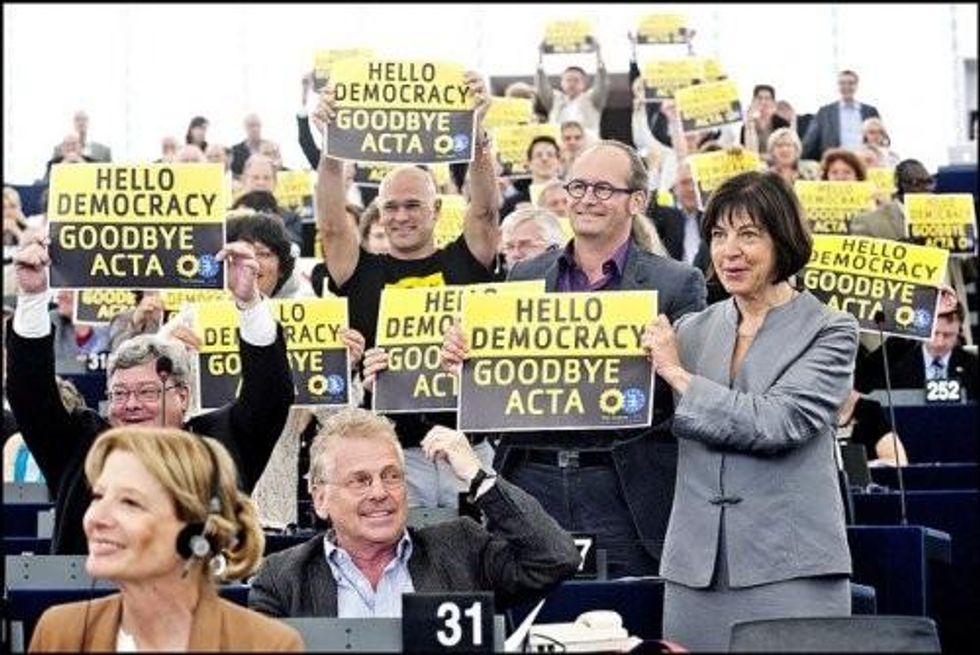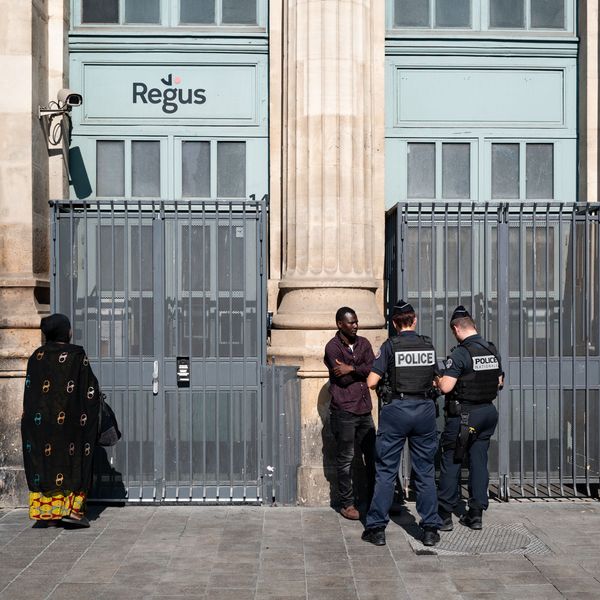EU Defeats ACTA
European Parliament votes against controversial Anti-Counterfeiting Trade Agreement

ACTA, the controversial online piracy treaty, was dealt a blow on Wednesday when the European Parliament voted overwhelmingly to reject it.
The European Parliament voted 478 to 39 against the Anti-Counterfeiting Trade Agreement, which was drawn up in secret and had been protested by hundreds of thousands across the EU who saw the treaty as an infringement on internet freedom.
President of the European Parliament Martin Schulz welcomed the decision and stated that "ACTA is the wrong solution to fight online piracy." He said that the treaty negotiations had lacked transparency and acknowledged the massive public mobilizations against the treaty.
"The majority of the parliament is of the opinion that ACTA is too vague - leaving room for abuses and raising concerns about its impact on privacy and civil liberties, on innovation, creativity and the free flow of information," wrote Schulz.
"We have to take all possible measures to fight piracy, but this should never be done at the cost of what has made the internet one of the most revolutionary technologies in history: the EP wants the web to remain free and open," he added.
Civil liberties advocates including Pirate Party leader Loz Kaye also welcomed the decision. "The European Parliament vote is a triumph of democracy over special interests and shady back-room deals. This is a significant victory for digital rights, and it's thanks to the tireless work of activists and grass roots organizations, including the Pirate Party world wide. Without this opposition, our representatives would have waved this agreement through. It is now clear that it is becoming increasingly politically poisonous to be 'anti-internet'," Kaye said.
With this vote, there is no possibility of EU ratification, leaving the future of the treaty uncertain.
An Urgent Message From Our Co-Founder
Dear Common Dreams reader, The U.S. is on a fast track to authoritarianism like nothing I've ever seen. Meanwhile, corporate news outlets are utterly capitulating to Trump, twisting their coverage to avoid drawing his ire while lining up to stuff cash in his pockets. That's why I believe that Common Dreams is doing the best and most consequential reporting that we've ever done. Our small but mighty team is a progressive reporting powerhouse, covering the news every day that the corporate media never will. Our mission has always been simple: To inform. To inspire. And to ignite change for the common good. Now here's the key piece that I want all our readers to understand: None of this would be possible without your financial support. That's not just some fundraising cliche. It's the absolute and literal truth. We don't accept corporate advertising and never will. We don't have a paywall because we don't think people should be blocked from critical news based on their ability to pay. Everything we do is funded by the donations of readers like you. Will you donate now to help power the nonprofit, independent reporting of Common Dreams? Thank you for being a vital member of our community. Together, we can keep independent journalism alive when it’s needed most. - Craig Brown, Co-founder |

ACTA, the controversial online piracy treaty, was dealt a blow on Wednesday when the European Parliament voted overwhelmingly to reject it.
The European Parliament voted 478 to 39 against the Anti-Counterfeiting Trade Agreement, which was drawn up in secret and had been protested by hundreds of thousands across the EU who saw the treaty as an infringement on internet freedom.
President of the European Parliament Martin Schulz welcomed the decision and stated that "ACTA is the wrong solution to fight online piracy." He said that the treaty negotiations had lacked transparency and acknowledged the massive public mobilizations against the treaty.
"The majority of the parliament is of the opinion that ACTA is too vague - leaving room for abuses and raising concerns about its impact on privacy and civil liberties, on innovation, creativity and the free flow of information," wrote Schulz.
"We have to take all possible measures to fight piracy, but this should never be done at the cost of what has made the internet one of the most revolutionary technologies in history: the EP wants the web to remain free and open," he added.
Civil liberties advocates including Pirate Party leader Loz Kaye also welcomed the decision. "The European Parliament vote is a triumph of democracy over special interests and shady back-room deals. This is a significant victory for digital rights, and it's thanks to the tireless work of activists and grass roots organizations, including the Pirate Party world wide. Without this opposition, our representatives would have waved this agreement through. It is now clear that it is becoming increasingly politically poisonous to be 'anti-internet'," Kaye said.
With this vote, there is no possibility of EU ratification, leaving the future of the treaty uncertain.

ACTA, the controversial online piracy treaty, was dealt a blow on Wednesday when the European Parliament voted overwhelmingly to reject it.
The European Parliament voted 478 to 39 against the Anti-Counterfeiting Trade Agreement, which was drawn up in secret and had been protested by hundreds of thousands across the EU who saw the treaty as an infringement on internet freedom.
President of the European Parliament Martin Schulz welcomed the decision and stated that "ACTA is the wrong solution to fight online piracy." He said that the treaty negotiations had lacked transparency and acknowledged the massive public mobilizations against the treaty.
"The majority of the parliament is of the opinion that ACTA is too vague - leaving room for abuses and raising concerns about its impact on privacy and civil liberties, on innovation, creativity and the free flow of information," wrote Schulz.
"We have to take all possible measures to fight piracy, but this should never be done at the cost of what has made the internet one of the most revolutionary technologies in history: the EP wants the web to remain free and open," he added.
Civil liberties advocates including Pirate Party leader Loz Kaye also welcomed the decision. "The European Parliament vote is a triumph of democracy over special interests and shady back-room deals. This is a significant victory for digital rights, and it's thanks to the tireless work of activists and grass roots organizations, including the Pirate Party world wide. Without this opposition, our representatives would have waved this agreement through. It is now clear that it is becoming increasingly politically poisonous to be 'anti-internet'," Kaye said.
With this vote, there is no possibility of EU ratification, leaving the future of the treaty uncertain.

